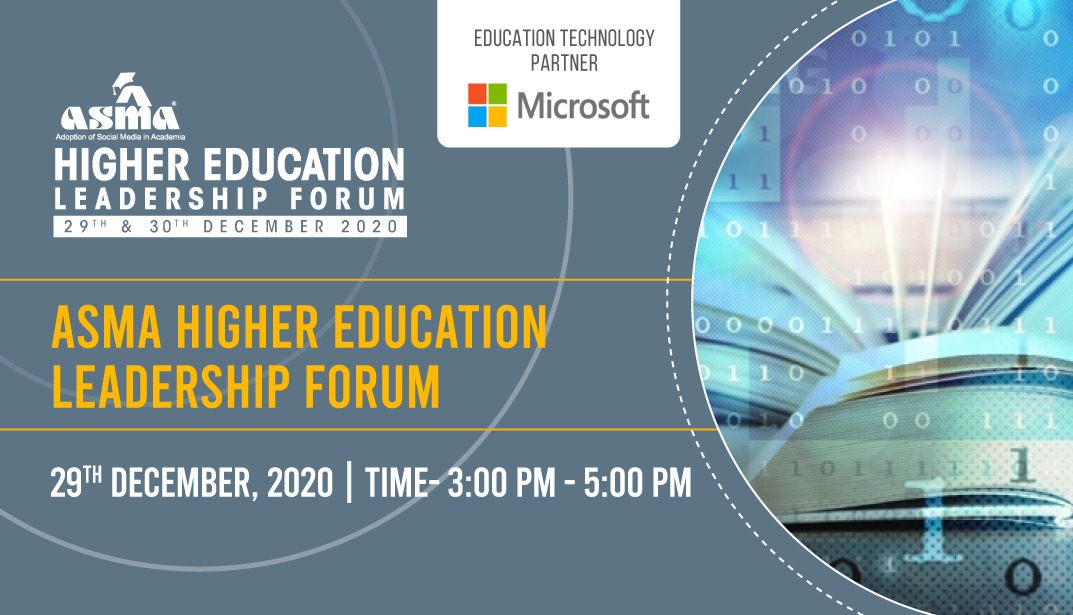AI and ML Will Personalise Education, Say Education Leaders at ASMA Higher Education Leadership Forum
Education leaders discussed 'How AI and ML Can Change the Way Education is Imparted’ during the virtual event held on 29th December 2020
The ASMA Higher Education Leadership Forum, in association with Microsoft, was held on the 29th and 30th of December 2020.
The 2-day virtual event examined how technology such as Artificial Intelligence and Machine Learning can offer various benefits that can revolutionise practically any aspect of the teaching/learning process.
The event also explored how education institutes are increasingly looking towards technology to help enhance the learning experience of students in a way that goes beyond online learning.
On the first day of the event, the panel of a distinguished panel of speakers discussed ‘How AI and ML Can Change the Way Education is Imparted’.
The panel comprised of leaders from the Higher Education and Technology sectors such as Kunwar Shekhar Vijendra, Co-Founder & Chancellor, Shobhit University, Ashok Kataria, Chairman, Ashoka Education Society, Prof Nihar Walimbe, Principal, Dhole Patil College of Engineering, Pune, Dr Vaishali Patil, Principal, International Institute of Information Technology, Dr Yogeshwari Phatak, Director, Prestige Institute of Management and Research, Dr Shailendra Singh, COO, Amrapali Institute of Hotel Management and Neeti Soota, Product Marketing Manager – Education, Microsoft.
The panel was moderated by Chandan Anand, Vice President of InnoServ Group and ASMA.
Neeti Soota, Product Marketing Manager – Education, Microsoft also presented an inaugural address that highlighted how technology is being leveraged to transform the education industry.
Soota remarked, “Education has seen a drastic transformation. It is not a surprise to anybody how education transformed. Education is a priority for our nation; it does not stop”.
Soota also explained that during the lockdown, as educational institutions reached out to their technology partners to help them navigate online learning, many initiatives were introduced.
She said that while there is world-class education in India, we must ensure that we are able to cater to the larger population in India, instead of to a few pockets that can afford it.
Ashok Katariya, Chairman, Ashoka Education Society, opined, “The pandemic has given us a way to start thinking about technology. If you go back to the last 50-60 years of education, the society, educators and students were all focused on how percentage a student has scored, but no one was asking what knowledge a student got. In society and in educator, the concept of practical need-based education is not absorbed”.
He continued, “Artificial Intelligence is the need of the hour, no one can stop it. AI will play a vital role and will lead to the transformation of the intelligence of every individual. It has also opened new areas of innovation.”
Kunwar Shekhar Vijendra, Co-Founder & Chancellor, Shobhit University agreed with Neeti Soota about how education is being transformed. He said, “In my generation, education transformed other, but today, due to COVID and technology, if education has transformed, it means it is the time to bring in a change and that change is coming”.
He remarked, “We have to ensure inclusive, equitable and quality education has to be provided to everybody. We have to promote lifelong learning opportunities for all”.
Shailendra Singh, COO, Amrapali Institute of Hotel Management, commented, “The pandemic has come as a blessing in disguise for all of us. Teachers were initially not open to online education. But they were forced to adapt to technologies such as Microsoft Teams and Zoom, so we were able to reach out to students and deliver to them the lecture content”.
He continued, “Teachers cannot be replaced by technology, Artificial Intelligence and Machine Learning will personalise education”.
Adding his thoughts to the discussion, Prof Nihar Walimbe, Principal, Dhole Patil College of Engineering, “In Engineering education, AI and ML are helpful because it provides wide variety and range of different areas where students will get exposure. Also, the fundamental which are difficult to imagine such as Electrical Engineering etc, they will become much simpler. Only providing video lectures is not enough; brainstorming input to the students and making them more inquisitive is more important”.
Dr Vaishali Patil, Principal, International Institute of Information Technology, said, “Because of the NEP expectations and the adaption to this pandemic has turned out to be an advantage in disguise to the education sector. We were forced to adopt the online teaching model, which expanded horizons.”
She added, “We should not forget that the teaching/learning process is governed by human-to-human interaction. While the technology today is also talking about human-machine interaction and this is where we can expect AI and ML to come into the picture. Yes, we have to adapt to change, but not deny the prime foundation of the teaching/learning process, where the interaction between the teacher and the student counts greatly towards the development of that student. With the changing scenario, AI and ML should help teachers take care of this teaching/learning process in a more personalised manner catering to the individual needs of students”.
Dr Yogeshwari Phatak, Director, Prestige Institute of Management and Research said, “We have experienced something phenomenal in education. Since the pandemic and the lockdown have taken place, we have fast-forwarded our technology in education and it’s something we really needed”.
She added, “We now cannot deny how important technology is in education. Technology such as AI and ML are very important to the educator sector in various fields, not just in teaching. I think they will really impact administrative work. It will impact faculty particularly in areas such as evaluations. AI and ML can also help us address issues of different paced learners. Blended learning will improve the quality of education”.



